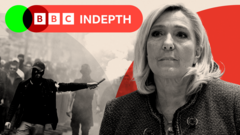Marine Le Pen's recent ban from running in the upcoming presidential elections has outraged the French far-right, with implications for the political landscape. Amidst calls for justice, supporters of Le Pen's party, National Rally, express indignation, navigating uncertain political waters ahead of the critical 2027 elections.
France's Political Turmoil: Marine Le Pen's Ban Ignites Far Right Outrage

France's Political Turmoil: Marine Le Pen's Ban Ignites Far Right Outrage
The ruling barring Marine Le Pen from the 2027 presidential election stirs controversy and rebellion in France's far-right camp, raising questions about the party's future.
Marine Le Pen’s recent disqualification from contesting in the 2027 presidential election is sending shockwaves through France’s political fabric, particularly within the far-right factions. This ruling has ignited a firestorm of outrage as Le Pen and her allies attempt to rally public support against what they perceive as an unjust court decision.
The fervent response from Le Pen’s National Rally (RN) reveals just how charged the current political atmosphere is. Key deputies have called on supporters to feel outraged, amplifying the discontent towards what they label an attack on democracy. However, the long-term implications of this decision for the RN remain unclear. Will it strengthen Le Pen's appeal or lead to further fragmentation of right-leaning voters in France?
In their fierce denunciations, Le Pen’s supporters assert that France’s judicial system has become politicized, undermining the electorate's right to choose their own leaders. Le Pen herself has likened her plight to that of Alexei Navalny, suggesting that her disqualification is an indication of her rising political strength. “The system has released a nuclear bomb,” she warned, indicating ominous days ahead for her rivals.
Prime Minister François Bayrou expressed concern about the impact of Le Pen's sentence on the current government, admitting to feeling troubled by the judiciary’s decision. In contrast, centrist politicians are advocating for the necessity of maintaining a separation between the judiciary and political affairs.
Despite the uproar, some polling data reflects a more composed public sentiment, with only 31% of respondents viewing the court's ruling as unjust. These figures suggest a potential divide where admiration for Le Pen does not necessarily translate into support for her political ambitions. With elections still two years away and President Emmanuel Macron unable to run again, the political landscape could change significantly before then.
Le Pen's recent legal troubles stem from convictions related to substantial financial fraud against the European Parliament. Despite acknowledging past party corruption, the RN's strategy during these proceedings may have backfired, leading to the severe consequences they currently face. Judges emphasized Le Pen's failure to demonstrate accountability or respect for lawful conduct as a contributing factor to her stinging five-year ban from public office.
The hypocrisy of support for Le Pen from various political elites becomes evident in light of their previous push for stricter anti-corruption measures, underscoring a critique of selective accountability in French politics. As political tensions rise, many are left wondering whether the narrative of Le Pen as a victim of systemic bias will hold sway over voters.
The future of the RN is now heavily dependent on how Le Pen and her team navigate these turbulent waters. Amidst legal appeals and potential parliamentary maneuvers, the prospect of new elections looms. If Le Pen’s ban holds, the RN may look to younger leadership, like Jordan Bardella, to resonate with a demographic increasingly dissatisfied with traditional politics.
As France stands at a political crossroads, questions linger about whether the far-right will harness public sentiment or continue to be viewed as a faction embroiled in controversy and corruption. The stakes are high as the public wrestles with Le Pen's legacy—will she be remembered as the harbinger of a populist resurgence, or merely as another sidelined figure in the complex tapestry of French political history?




















